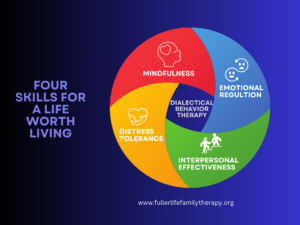The Art of Parental Conflict: Tips for Arguing To Your Kids’ Benefit
Parental conflict is inevitable. It’s going to happen. There is also a clear link between interparental conflict and children’s behavioral and emotional problems, in both divorced and intact families. However, parents can fight in ways that fosters positive outcomes in their children.
The Importance of Fighting Fair
Research has shown that the content of the argument is less impactful on childhood development than the way decisions are handled by the parents. Kids are constantly learning how to interact and engage by watching their parents. Throwing verbal low-blows, criticizing and blaming back and forth demonstrates a lack of respect for each other. (Even worse, you may find your middle-schooler responding just as disrespectfully to you and to others!) Instead, choose to put away defensiveness, be curious about the perspective of your spouse, and treat them kindly.
This does not mean one parent just giving in to the other parent though. “We did a study on that,” says psychologist E. Mark Cummings. He has studied the effects of interparental conflict on children for decades. Cummings and his colleagues at Notre Dame found that kids do not respond well to seeing their parents capitulate.
In fact, the most problematic reactions from kids came from witnessing parents express nonverbal anger like stonewalling, avoidance, shutting down, or being unwilling to cooperate. When parents withdraw from one another it is actually more disturbing to kids in the long term than open conflict.
He explains, “Kids understand hostility. It tells them what’s going on and they can work with that. But when parents withdraw and become emotionally unavailable, kids don’t know what’s going on. They just know things are wrong.” It becomes harder for kids to regulate themselves. This remained true regardless of the relationship status of their parents.
Create a Strong Partnership (outside of your kids)
University of California Berkley’s Philip Cowan studies the impact of the marriage relationship on children. He found a connection between improvements in the quality of marital relationships and parent-child relationships and the children’s ability to adapt. In other words, the quality of your marriage, or relationship with your ex-spouse, matters because it affects parenting.
As therapist and psychologist Laura Berman, Ph.D., explains, “No matter how sacrilegious it sounds…you need to put your relationship before your children. A strong relationship provides security for your children and demonstrates how a loving, respectful partnership. What could be more important?” This may look like being more intentional about daily touch points with one another during the day, showing affection in front of your children, holding conversations where children are not the main topic. If parenting issues are continually eroding your marriage, it may be helpful to evaluate whether your emotional desires are being met through your children.
What if We’re Divorced?
Even if you are not together anymore, it is better for children to have parents who choose to back each other up and work together as a team, than to have parents (even with all the greatest parenting skills) who lack a supportive relationship. Take time to communicate with your co-parent to verify stories from your children and involve one another in important decisions affecting your kids.
Is Conflict bad?
Interparental conflict isn’t always a bad thing. In fact, children exposed to healthy conflict can learn effective ways to manage differences and solve problems. They grow when they see their parents calm themselves down, assert themselves without putting the other down, and regulate their emotions instead of shifting blame. Fuller Life is here to help families stay on the same team and raise strong, healthy, secure children.
D.D. (2014, April 30). What Happens to Children When Parents Fight. Retrieved February 15, 2018, from http://www.developmentalscience.com/blog/2014/04/30/what-happens-to-children-when-parents-fight
Gregory, L. (2017, November 30). When Parents Fight: The Pros and Cons of Arguing in front of Your kids. Retrieved February 15, 2018, from https://globalnews.ca/news/3655488/when-parents-fight-the-pros-and-cons-of-arguing-in-front-of-your-kids/&p=DevEx,5036.1
Additional Reading:
 Contributed by Angela Blocker, M.A, LMFT Associate
Contributed by Angela Blocker, M.A, LMFT Associate
Clinical Supervision by Amy Fuller, PhD, LMFT, LPC








